28.11.2025...Sivaji's..Untouchables News in India.by Team Sivaji.9444917060.follow us in all Social Media.
Assam Cabinet approves report on ST status for six communities
The report was submitted by a three-member Group of Ministers headed by Education Minister Ranoj Pegu
Published - November 27, 2025 10:40 am IST - GUWAHATI

Assam Chief Minister Himanta Biswa Sarma. | Photo Credit: PTI
GUWAHATI The Assam Cabinet, chaired by Chief Minister Himanta Biswa Sarma, has approved a report by a Group of Ministers (GoM) on granting Scheduled Tribe status to six communities of the State.
"Fitting Tribute": PM Modi Unveils Dr Ambedkar's Bust In Paris
The PM marked Constitution Day on Wednesday with a letter to citizens, calling for increased focus on constitutional duties and wider participation in democratic processes.
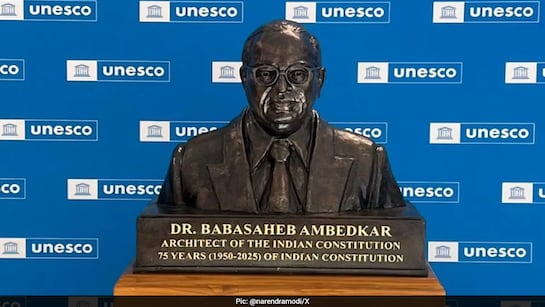
As India celebrated the adoption day of its Constitution on Wednesday, Prime Minister Narendra Modi prided on the unveiling of Babasaheb Ambedkar's bust at the UNESCO Headquarters in Paris.
The PM said that it was a "fitting tribute" to Dr Ambedkar and his role in making the Indian Constitution.
"It is a matter of immense pride that today, on Constitution Day, a bust of Dr Babasaheb Ambedkar was unveiled at the UNESCO Headquarters in Paris. This is a fitting tribute to Dr Ambedkar and his role in the making of our Constitution. His thoughts and ideals give strength and hope to innumerable people," PM Modi posted on X.
The PM marked Constitution Day on Wednesday with a letter to citizens, calling for increased focus on constitutional duties and wider participation in democratic processes.
Constitution Day is observed annually on 26 November to commemorate the adoption of the Constitution in 1949.
In his letter, Modi noted that the Union government declared 26 November as Constitution Day in 2015 to highlight the role of the Constitution in India's institutional framework. He referred to moments from 2014 and 2019 when he bowed at the steps of Parliament and placed the Constitution on his forehead, stating that these gestures reflected his regard for the document.
In his message, the Prime Minister recalled the work of the Constituent Assembly, chaired by Dr. Rajendra Prasad, and the Drafting Committee led by Dr BR Ambedkar. He also mentioned the contributions of women members of the Assembly.
Earlier, President Droupadi Murmu recalled the history of the drafting of the Constitution. She remembered Dr Babasaheb Ambedkar, who was the Chairman of the Drafting Committee, and praised his efforts in drafting India's supreme legal document.
The Constitution of India was adopted on November 26, 1949, and came into effect a few months later, on January 26, 1950. The document was extensively debated and agreed upon by the Constituent Assembly. The document established India as a "Sovereign, Socialist, Secular, Democratic Republic" with the aim of securing Justice, Liberty, Equality, and Fraternity for all citizens.
It is the longest written Constitution in the world, demarcating the separation of powers, structure of administration, courts and legislative departments for the country. The Constitution calls for adhering to constitutional supremacy.
(Except for the headline, this story has not been edited by NDTV staff and is published from a syndicated feed.)
Dalit community in Uttarakhand elects its own village head, breaking a 150-year tradition
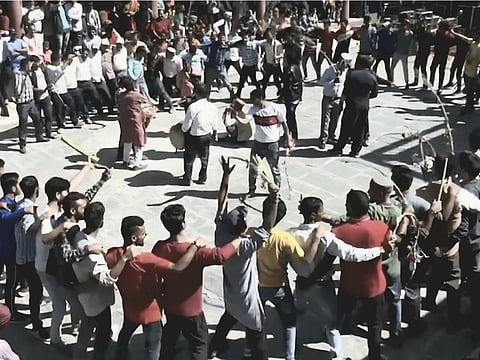
DEHRADUN: In a significant assertion of self-determination, the Dalit community of Bijnu Bijnad village in the remote Jaunsar-Bawar region of Uttarakhand has broken a 150-year-old social convention by independently electing its own ‘Syana’ (village head).
For what is believed to be the first time in nearly 150 years, the community chose its own leader, a move that required the intervention of the local police administration to ensure a smooth transition within existing social structures.
Historically, villages in this region comprising both Dalit and dominant Rajput populations shared a single ‘Syana’. This leader was traditionally selected only from affluent or influential non-Dalit families, effectively sidelining lower castes from participation in village governance.
“Previously, there was only one ‘Syana’ for the entire village. Now, we will have two,” said a resident involved in the process. The newly elected Dalit leader was ceremoniously paraded atop a wooden elephant.
The 35 Dalit families spearheading this change needed assistance from the police administration to establish their new governance structure without confrontation.
The ‘Syana’ post, crucial for mediating local disputes and representing the village, has long been dictated by caste hierarchy since the British era.
Bharat Singh Rana, former Pradhan and social activist from the neighbouring Gram Panchayat Bhoonth, explained the depth of the tradition being challenged.
“It is difficult to pinpoint the exact duration of the leadership exclusion for Dalits, as it was based on social custom and caste hierarchy rather than written law,” Bharat Singh told TNIE. “If we assume this hierarchy was established at least since the British period (18th–19th century), this step challenges a social structure that has been entrenched for approximately 150 to 200 years.”
Rana also emphasised the contemporary significance of the development. “If we view this in the context of independent India, where principles of reservation and social justice are enshrined, this move is a significant effort to dismantle the 75-year-old social inequality that persisted even after Independence.”
The election of a separate Dalit ‘Syana’ establishes a precedent for autonomous leadership in the Jaunsar-Bawar region, marking a major step towards dismantling entrenched caste-based governance practices.
Udaipur – In a powerful stand against the scourge of child marriage, the quaint hamlet of Darouli Gram Panchayat in Rajasthan's Vallabh Nagar tehsil transformed into a beacon of hope on Thursday. Echoing the revolutionary lines from a popular folk song- "Let the torches be lit, the people of my village march on; now the darkness will be defeated by the people of my village" hundreds of villagers, women, youth, and children gathered at Shri Yade Devi Temple grounds for a massive awareness and pledge event.
Organized under the joint aegis of Gayatri Seva Sansthan and the Just Rights for Children Network, in support of the Ministry of Women and Child Development's "Child Marriage Free India" campaign, the program marked the launch of a 100-day intensive public awareness drive.
The initiative aims to eradicate child marriages from the region and declare Darouli a "model child marriage-free panchayat" within the next year, setting a precedent for rural Rajasthan.
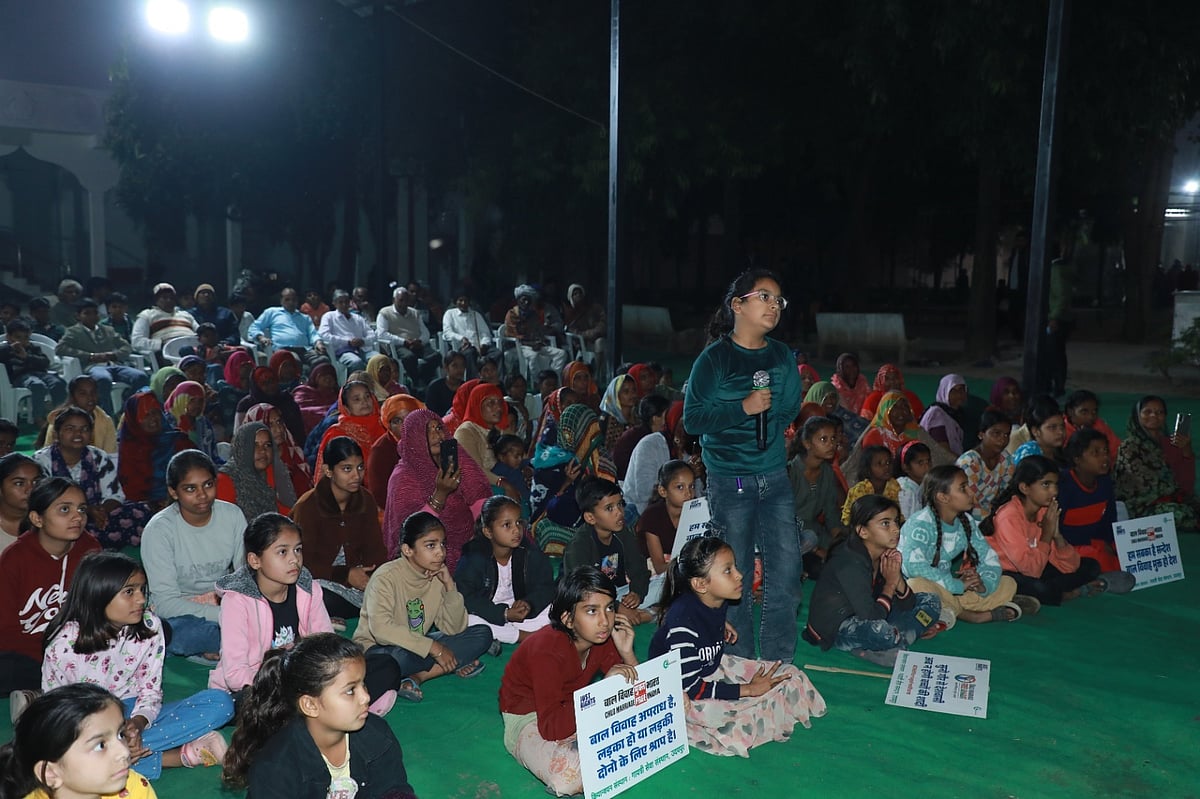
The event culminated in a grand torch march (mashal yatra), symbolizing enlightenment over ignorance, where participants took a collective oath to prevent any child marriage in the village under any circumstances. The electric energy among the crowd, especially the enthusiastic youth and children, underscored a generational shift: the new India refuses to tolerate this age-old evil.
Chief guest Manan Chaturvedi, former Rajasthan state minister and ex-chairperson of the Rajasthan Child Rights Commission, addressed the gathering with a clarion call. "Child marriage is an injustice to children's futures. We must collectively wipe this stain from society," she declared. Emphasizing the need to prioritize girls' education and safety, Chaturvedi praised the efforts of Gayatri Seva Sansthan and Just Rights for Children Network. "Society must now stand united against child marriage, embracing change for a brighter tomorrow."
Ahmedabad- Members of the Dalit Buddhist community in Gujarat have strongly objected to the state government's neglect to declare Buddha Purnima as a gazetted holiday. In 2025, Buddha Purnima was observed on May 12, and while the Gujarat government listed it only as an optional/restricted holiday, the central government and several other states recognized it as a mandatory public holiday.
Community leaders argue that this decision reflects the state's indifference toward Buddhist heritage, especially at a time when Prime Minister Narendra Modi repeatedly portrays India as the 'land of Buddha' on international platforms, promoting messages of peace to the world. In recent years, incidents of Dalit conversions to Buddhism have surged in Gujarat, yet government policies have not accorded sufficient recognition to this religious identity, leading to widespread discontent within the community.
The significance of Buddha Purnima is profound and multifaceted for followers of Buddhism. Observed on the full moon day of the Vaishakha month, this festival symbolizes the tripartite events in the life of Gautama Buddha, his birth, enlightenment (Bodhi), and Mahaparinirvana (final passing). Born around 2,500 years ago in Lumbini (Nepal), Siddhartha Gautama attained Buddhahood at age 35 under the Bodhi tree in Bodh Gaya (Bihar) after intense meditation, propounding principles such as the Eightfold Path, Four Noble Truths, and the ideals of non-violence and compassion.
Buddha Purnima is not merely a religious observance but a beacon of social equality, ethics, and peace, offering relevance to contemporary global challenges like violence, inequality, and environmental crises. In India, following Dr. B.R. Ambedkar's mass conversion of millions of Dalits to Buddhism in 1956, the festival has become particularly vital for the Dalit Buddhist community, serving as a cultural symbol of resistance against caste discrimination. This year, millions across the country marked it with meditation sessions, prayer gatherings, and recitations from Buddhist scriptures, underscoring its enduring relevance.
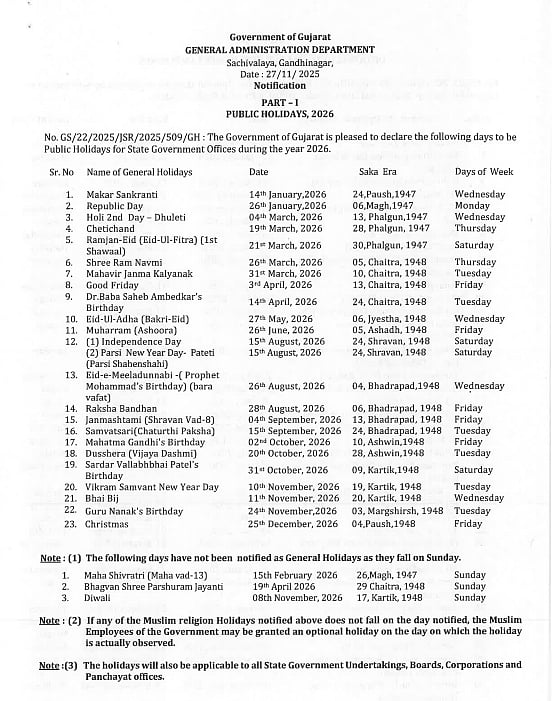
According to the official list of public holidays issued by Gujarat's General Administration Department (GAD) for 2026, Buddha Purnima is not included as a gazetted or mandatory holiday. Instead, it appears in the optional holidays category, allowing employees to take leave at their discretion, while government offices and educational institutions operated normally.
In contrast, the central government's holiday list, issued by the Department of Personnel and Training (DoPT) and applicable for 2026, designates Buddha Purnima as a gazetted holiday, which would mean closures of central offices, banks, and public institutions nationwide.
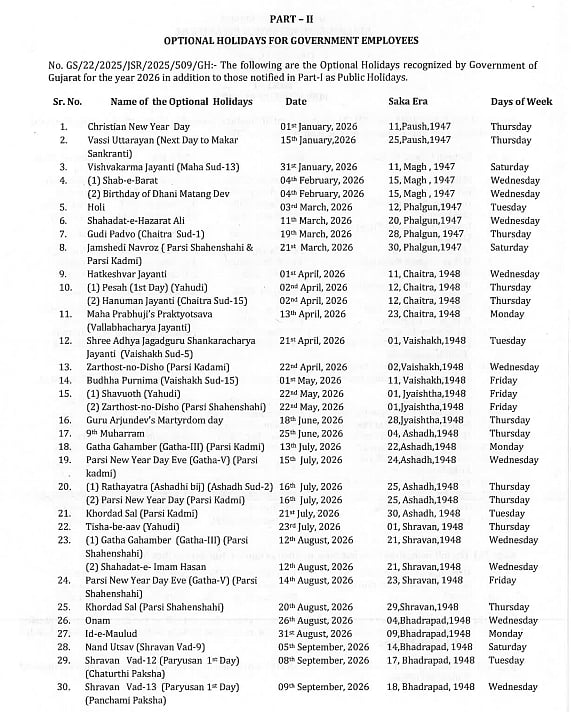
Meanwhile, several other states grant Buddha Purnima as gazetted public holiday considering the Buddhist population and cultural importance. These included Arunachal Pradesh, Assam, Himachal Pradesh, Jammu and Kashmir, Jharkhand, Madhya Pradesh, Maharashtra, Mizoram, Sikkim, Tripura, Uttar Pradesh, and West Bengal.
Mumbai- The death of 13-year-old Kajal Gaur of Vasai has shaken the entire state of Maharashtra. A teacher allegedly punished her with 100 sit-ups for being 10 minutes late to school. Her health deteriorated subsequently, and she died while undergoing treatment at JJ Hospital.
A petition has been filed in the Bombay High Court in this entire matter, demanding that the court take suo motu cognizance and initiate action.
This petition has been filed by advocate Swapna Pramod Kode, addressed to the Chief Justice, Chandrashekhar. She has appealed to the court to expedite the investigation of this matter, stating that it is not just the death of a child but a human and constitutional issue.
The petition demands the formation of a Special Investigation Team (SIT) to investigate the school's illegal operations and all the circumstances behind this death. It also seeks immediate registration of an FIR against the school management and the accused teacher.m
Here’s a roundup of recent (as of late November 2025) developments in India concerning reservation for SCs / STs / Adivasis, classification policies, and related justice and political-representation issues. I did not find a large set of news exactly dated 28 November 2025 — but several important stories from mid-to-late November 2025 show the current status and direction.
---
🔎 Key Recent Developments on SC/ST / Adivasi Reservation & Representation
Supreme Court of India & Internal Reservation / Quota Updates
The Supreme Court formally introduced a quota policy for its own staff: 15% for SC and 7.5% for ST employees (appointments + promotions).
This marks a symbolic and institutional step: even the apex judicial body is now subject to reservation norms — a reflection of the broader shift in how reservations are being restructured.
---
State-level Moves: Sub-categorisation & Internal Reservation
Telangana
Telangana has become the first state in India to implement sub-categorisation of SCs in jobs and education. Under the new scheme, the 59 SC sub-castes are divided into three groups: Group I (most backward), Group II (moderately backward), and Group III (relatively better-off). The SC quota (within the 15% allotment) is now distributed as 1% for Group I, 9% for Group II, and 5% for Group III.
This move follows a judgment by a seven-judge bench of the SC, which allowed sub-classification of SC/ST categories.
Karnataka
Karnataka’s Cabinet has cleared a proposal to split its 17% SC quota into three sub-groups — effectively formalising internal reservation among Dalit sub-castes. The shares decided: 6% for “SC-Right (Holeya)”, 6% for “SC-Left (Madiga)”, and 5% for Lambanis, Kormas, Korchas, Bhovis and 59 nomadic / backward groups.
A fresh survey has been ordered to gather empirical data for internal quota implementation among SCs.
As a result of these changes, Karnataka’s overall reservation quota (SC + ST + OBC) is reportedly around 56% in jobs/education under the new roster.
---
ST / Tribal Representation — Emerging Demands
In Karnataka, a tribal coalition recently demanded that the state Government constitute a commission to formalise internal quotas among ST (tribal) communities as well — arguing that despite reserved assembly/LS seats, many of the state’s 49 tribal communities remain under-represented.
This reflects growing pressure on states to not only treat SC and ST as monolithic quotas, but to dig deeper into intra-group disparities, especially within Adivasi / tribal groups, to ensure more equitable access.
---
Political Representation & Local Governance — Panchayat / Local Body Quotas
In Telangana State, the government recently issued a Government Order setting up new reservation guidelines for SC, ST, Backward Classes (BC), and women for the upcoming panchayat elections — all within the 50% cap mandated by the SC.
For SC/ST categories, reservation for ward members and sarpanch seats are being allocated based on mixed data sources: 2024 caste survey for ward seats; 2011 Census for SC/ST sarpanch seats. Women’s reservation applies across all categories via random draw, and seat allocations will be rotated over election cycles.
---
Domicile, Migration and Who Gets Reservation — Recent Court Verdicts
The Uttarakhand High Court on 12 November 2025 dismissed 32 writ-petitions filed by individuals who migrated (or married into) the state and sought SC-reservation for state jobs. The court held that SC reservation benefit cannot be transferred simply by migration or marriage — and is only available to those whose caste is recognised in the state & who meet domicile (or origin) requirements.
The verdict reaffirms a long-standing principle: reservation benefits (in many states) are tied to domicile or state-recognised caste lists, not just to SC/ST identity in general.
---
⚠️ What’s the Bigger Picture — Trends & Challenges
The move toward sub-categorisation (i.e. splitting SC / ST quotas internally) — as seen in Telangana and Karnataka — is gaining momentum. This addresses longstanding criticism that dominant sub-castes corner most benefits, while the most disadvantaged remain left out.
There’s growing advocacy for similar internal reservation within ST / tribal communities, especially where there is wide economic and social disparity among different tribes.
However, reforms like domicile-based eligibility (as enforced by the Uttarakhand HC) highlight that reservation laws remain complex: migration, inter-state mobility, marriage — all can affect eligibility for SC/ST quotas.
Implementation challenges remain — surveys, data accuracy, caste-/tribe-lists per state, and legal-constitutional constraints (like the 50% cap on reservations).
---
If you like — I can pull up a full list of top 10 recent news (since Oct 2025) on SC/ST/Adivasi/reservation issues across all major states — that gives a quick snapshot of the national current affairs.
Recent Dalit news includes Dalit organisations in Karnataka demanding that Home Minister G Parameshwara be made Chief Minister if there is a leadership change in Congress. Dalit groups have staged protests, including a dramatic half-naked protest in Tumkur, demanding representation and warning of larger agitations if Dalit voices continue to be sidelined in politics. This reflects ongoing political mobilization by Dalits for greater leadership roles ��.Regarding atrocities against Dalits, I found past reports of caste violence, such as a 2021 incident where around 200 upper caste members attacked a Dalit locality in South India, resulting in serious injuries and inadequate police response. There are also recent concerns about continuing atrocities against Dalits, with Tamil Nadu's Governor expressing deep concern about the persistence of caste-based violence despite high literacy rates in the state ���.Additionally, there are reports of two Dalit youths dying in a road accident in Dharmapuri, with their kin alleging the deaths were related to caste killing, highlighting ongoing issues of caste-based violence and discrimination �.If you want, more detailed and recent daily atrocity reports or Dalit news from a particular region can be searched.please contact us in WA.9444917060.
AN APPEAL TO ALL.
Friends our UT News team were distributing water,tea,coffee,buiscates,tiffen and noon lunch to the visiters who are coming to Dr Ambedkar மணிமண்டபம்,Dr Ambedkar statues at Koyambedu and Kodambakkam.
We request our friends to donate,contribute for the purpose.by sending a little amount of Rs 100.by GPay to 9444917060.Sivaji.A


















Comments
Post a Comment